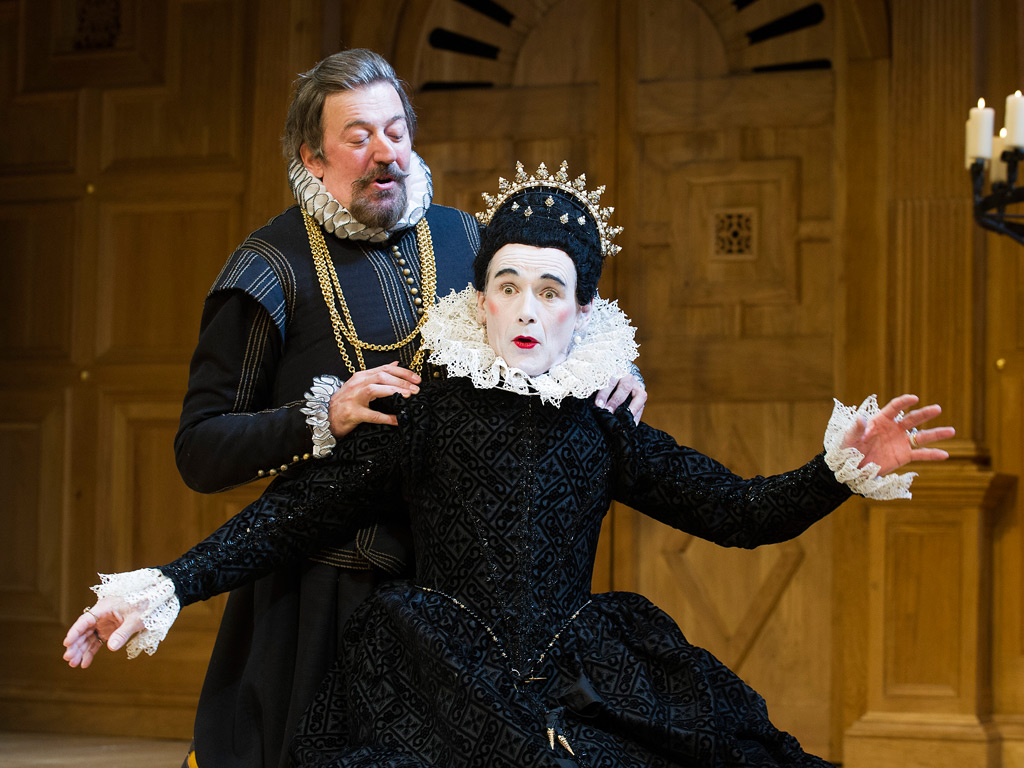Cutting all state funding to the arts would be monstrous
written for The Spectator, 28 April 2014, based on ‘The Next Stage”, in The Modernisers’ Manifesto

Stephen Fry and Mark Rylance in the Globe production of ‘Twelfth Night’. Photo credit: Geraint Lewis
One of the best things about The Spectator is that it has no party line. As its dauntless refusal to compromise on Leveson Inquiry has shown, it is incomparably committed to the free speech of its writers. So only here could a humble arts blogger announce that this magazine’s editor, Fraser Nelson, was riproaringly, doltheatedly, cloven-foot-in-mouth wrong in his post on arts funding last week. On pretty much everything.
Fraser’s right about one thing: Sajid Javid will make a great culture secretary, because unlike most culture bureaucrats, he gives a toss about staying solvent. Running culture by committee has always been a problem: the Department of Culture, Media and Sport (DCMS) remains a bloated department. So dedicated is it to assessing whether taxpayers’ money is spent on nice, cuddly cultural orgs which meet artificial targets on education, diversity and ‘impact’ that plenty of the arts budget is still being spent on ‘legacy’ officer salaries rather than buying children’s books in libraries. All bureaucracies exist to justify their own budgets: the DCMS is no exception.
But to leap from here to claim that we shouldn’t spare a single penny to invest in the arts is monstrous. Not just because Fraser completely misnomers the arts as ‘the pastimes of the rich’ (we also subsidise Wimbledon, through the Lawn Tennis Association), but because when he praises commercial theatres like The Globe, which ‘requires zero subsidy’, he misunderstands the economic relationship between commercial and subsidised arts. He’s right that theatres like The Globe ‘demonstrate the falseness of the choice between commercial successful and artistically brilliant’ – but in dividing the arts world neatly into ‘commercial’ and ‘subsidised’, he’s making just as false a dichotomy.
Yes, The Globe receives no annual government support (it receives a fair bit for ‘special projects’, such as filming and live-streaming its recent flagstream Globe to Globe Festival.) But it is run by Dominic Dromgoole, who learnt how to manage an arts centre as the director of a leading fringe venue, the Bush Theatre. The strength of subsidised theatres – like the Bush – means we train up and produce some of the greatest commercial artists in the world. Dromgoole’s predecessor, Mark Rylance, learned his trade at the RSC – and he’s just been raking in the chips as Olivia in the transatlantic tour of Twelfth Night, with Stephen Fry.

Chris Haydon’s production of Twelve Angry Men, at the West End’s Garrick Theatre. Photo credit: Robert Day
Over at London’s subsidised Gate Theatre (full disclosure: I’m on their development working group), artistic director Chris Haydon has just dipped his toes into the commercial world to direct the acclaimed Twelve Angry Men at the West End’s Garrick Theatre. The taxpayer won’t pay a penny for Twelve Angry Men, but we’ll rake in the tax receipts from big name producer Bill Kenwright, along with our share of the £2.7 billion spent on dinner, drinks, transport, etc., by tourists who visit the West End each year. And this whole commercial operation is dependent on the skills of a cast and crew trained in subsidised theatre: Haydon was Josie Rourke’s number two at the Bush before he took over the Gate, while star Tom Conti (a rare Tory thesp) started life at the Dundee Rep, long before he hit TV.
Subsidising theatre doesn’t mean throwing money at wastrels to play to empty houses. Instead, long-term funding relationships between the Arts Council and gold-star theatres allows them to think in three-year cycles rather than six-month seasons, giving artists the freedom to take risks, or nurture a show in development until it’s ready to be a hit. The classic example is the RSC’s Matilda, which took seven years of experiments (those cutesy children were trialed as puppets first). Then, perfectly formed, Matilda emerged from susidised Stratford, transferred to the West End, and sent RSC box office receipts up to £31.6 million.
But it’s in precisely that fluid relationship between commercial and artistic that the real scandal lies. It’s one thing for the taxpayer to support the training of an artist who might later in his career become a film star; it’s quite another to pay the initial costs of a production which immediately makes a commercial profit. Taxpayer investment in the arts is precisely that: investment. When subsidised theatre makes a profit, we should get our investment back.
As I argue in the forthcoming Modernisers’ Manifesto, which I have co-edited with Ryan Shorthouse and James Brenton for the Bright Blue think tank, the CMS should look urgently at schemes for the Arts Council to reclaim profits on shows like Matilda. The National Theatre’s most successful recent export is War Horse, which as National Theatre director Nicholas Hytner himself notes, ‘started as an experiment in our Studio. We spent about £50,000 on its development, and about £500,000 putting it on. In the last four years it has made the NT £11m.’
This is a national scandal. I’m sure the National does wonderful things with its profits, but it’s not Hytner’s money to play with. A large amount should be going back to the Arts Council, if not the taxpayer directly. At least War Horse’s profits have been funding theatre, not private limousines. Back in the 1980s, Trevor Nunn and Peter Hall were forced to deny claims they’d amassed personal fortunes from shares of the transfer of their RSC and National Theatre musicals to the West End. Whatever the truth, this was a great opportunity for the DCMS to clarify the mess, and they blew it. Thirty years later, perhaps Savid Javid can finally get round to it.
The Spectator has never been a place that dismisses the value of the arts, or their role in preserving England’s cultural heritage. One of my favourite posts ever by Fraser is his use of Walt Whitman to defend Gemma Worrall. As Fraser notes, ‘The Spectator’s great coalition of readers include those who think poetry is more important than politics’. We can’t live on data analysis alone. But it is possible to think analytically about the government’s relationship with the arts, without torpedoing the whole industry.
One in 12 Brits are employed in the creative economy. The richness of Britain’s intellectual life is the social investment that underpins everything from videogame design to publishing. Ensuring that every child in Britain has access to this intellectual legacy is the cornerstone of Michael Gove’s schools revolution. The value of growing up in a society which privileges the imagination is beyond quantification.







